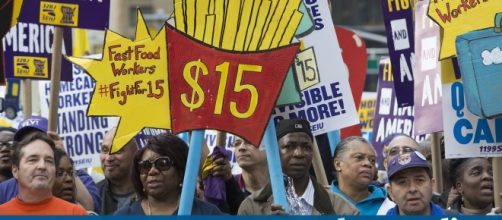What’s the big deal?
There have been advocates demanding a raise in minimum wage for years now, but many have argued against it due to the repercussions of increasing minimum wage too rapidly. However, the demand to raise minimum wage seems to be gaining some steam across the US. Many are learning that maybe taking a more gradual approach is a better economic option.
Many states and municipalities are realizing that $7.25/hr. may not be enough for most people to keep themselves (let alone a family) out of poverty. Many local cities and cities/municipalities have announced laws that will slowly raise the minimum wage within the city limits.
Some senators are pushing for states to pass such laws, although none have been passed. One thing, however, is clear: the call for minimum wage to be a “living wage” is gaining support from all political parties.
The wage-raising movement:
This movement is sweeping across both parties as well as gaining the support of many Independent voters. On January 1st, 2015 there were 20 states plus Washington DC who saw their minimum wages rise with the new year beginning. By the end of 2015, there were 4 more states that joined that movement.
The forerunner in the city-wide movements is the city of Seattle, the largest metropolitan area that passed legislation that will raise the minimum wage from the current state-required $9.32/hr.
up to $15.00/hr. by 2017 for the city’s big businesses. By 2021 the law will apply to smaller businesses within Seattle city limits. Only the city of Seattle passed this law, not the entire state of Washington. No state has yet passed such legislation.
The mayor of Los Angeles is pressing for a bill to raise the minimum wage from the current $9.00/hr up to $13.25/hr. not quite the $15/hr. that some Democrats want, but a vast improvement over the current state of things. Another is San Francisco, pushing for a hefty raise from $10.74/hr. for workers within the city limits up to $15/hr. by 2018.
The caveats to higher wages
One class of workers that don’t have to be paid the minimum wage are disabled workers.
A law in 1938 was passed that states could pay anyone “whose earning or productive capacity is impaired by a physical or mental disability including those related to age or injury” less than the federal minimum wage. This law has remained largely unchanged since. Many companies and businesses pay about 400,000 workers across the US less than minimum wage every year. The salary these employees get is largely at the discretion of what their management or boss thinks their work is worth. Organizations such as the National Disability Rights Network (NDBRN) and Association of People with Disabilities (ADA) have long called for this to be changed, calling the laws unethical and immoral to those in the disabled population.
Businesses making less than $500,000 in profit every year and not doing business across state lines are also exempt from this law. Teenage trainee workers who are being trained to do jobs that are approved by their university or institution and are aged 20 or under may by paid $4.25/hour for the first 90 days of their employment. Businesses can get away with paying 85% of the minimum wage to students working full-time in retail, agriculture, or any work performed within any institution of higher learning which means they earn $6.16/hour. Students who work part-time in programs accredited by their school or training center for vocational training purposes can be paid 75% of the minimum wage or $5.44/hr.
Workers who are able to be tipped are only required to be paid $2.13/hr. by their main company. Home health aides were not paid minimum wage if they worked for an agency until a new federal law was passed on January 1st, 2015. Others left unprotected include newspaper delivery persons, independent babysitters, and those working with temporary/seasonal businesses.
Conclusion
There is still a long way to go to get to $15/hr. However, until federal laws are passed to ensure all workers who work in smaller businesses or in unregulated industries, as well as the disabled, are paid a fair wage, it is unlikely to become a federal law anytime soon.

